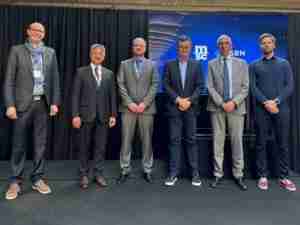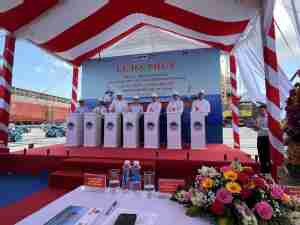US Gulf port leaders would like to see more flexibility in US Army Corps of Engineers allocations so that recovery may be hastened for a maritime facility struck by a natural disaster.
At the Spring meeting of the Gulf Ports Association of the Americas, US delegation members voted on May 31 to seek support in US Congress for legislation to permit the Corps to shift funds within a district to swiftly address dredging needs of a port impacted by a hurricane, flood or other natural disaster.
H. Thomas Kornegay, executive director of the Port of Houston Authority, urged the action. He said he would like to see officials of ports be able to make 'agreements like that among ourselves' that would allow one port emergency access to funds already allocated for a channel project at another port. The following year, a comparable Corps allocation for the stricken port could go to the port that had freed up the funds the previous year.
In discussion on another dredging-related issue, delegates were cautioned by Houston transportation attorney Bill Jackson that they should seek indemnity agreements with port tenants and easement holders to protect their ports from being stuck with astronomical cleanup expenses ' and the ensuing costs of project delays ' if contaminants found in their channel beds put a halt to dredging.
Often, as was the case recently at the Port of Texas City, contamination sources can date back several decades, with the precise source either being difficult to legally pinpoint or perhaps no longer in business, thus the port would be 'left holding the bag when everybody else is gone,' said Jackson, a founding partner of the firm of Connelly, Baker, Maston, Wotring & Jackson LLP.
In the Texas City case, confidential settlements were made with a half-dozen pipeline companies, generating sufficient money to pay for remediation and to fund a perpetual trust to address similar issues should they arise in the future.
Also at the GPAA Spring meeting, hosted on South Padre Island by the Port of Brownsville, delegates were told that a federally funded project based at the University of Houston could serve as a nationwide template for public-private partnerships for maritime security.
Dr. Shin-Shem Steven Pei, executive director of the Southwest Public Safety and Technology Center, said a center for excellence in maritime security, funded through the National Institute of Justice, bodes to bring numerous entities into partnerships that benefit public safety and homeland security without unduly inhibiting the movement of ships and goods.
'We're trying to use the Gulf Coast as a test bed and a model for the rest of the nation,' said Pei, whose doctorate is in solid state physics. 'The key is to ensure that the supply chain remains intact and to protect long-term viability and profitability.'
At a brief meeting of the Texas Ports Association, also held May 31 at the Radisson Hotel on South Padre Island, leaders expressed satisfaction with actions taken during the just-ended session of the Texas Legislature.
Those actions included defeat of a bill that would have allowed creation of inland port authorities. That bill had been promoted by Ross Perot, Jr.'s Hillwood Development Co., which has primary holdings in Alliance, an inland city north of Fort Worth.









